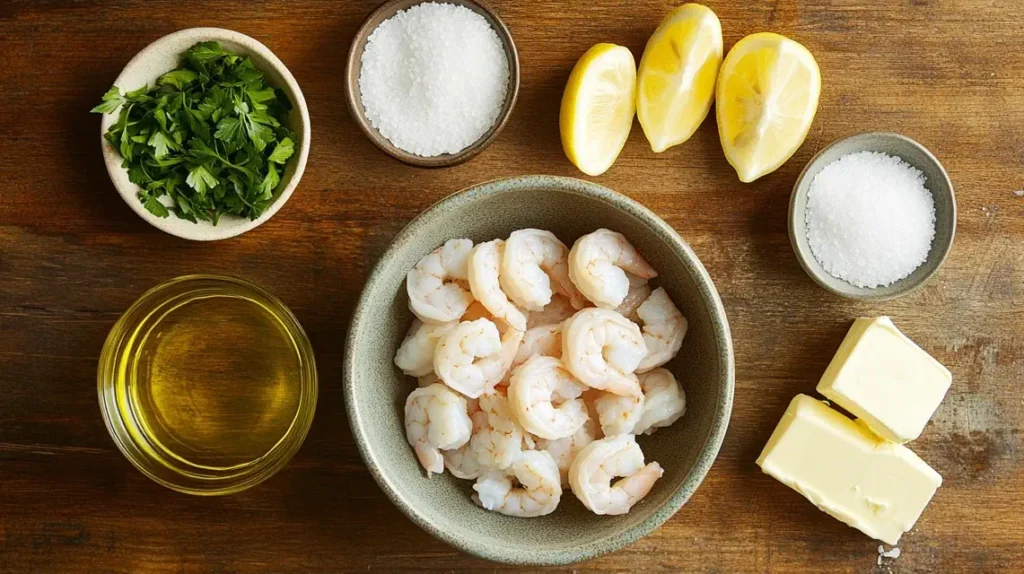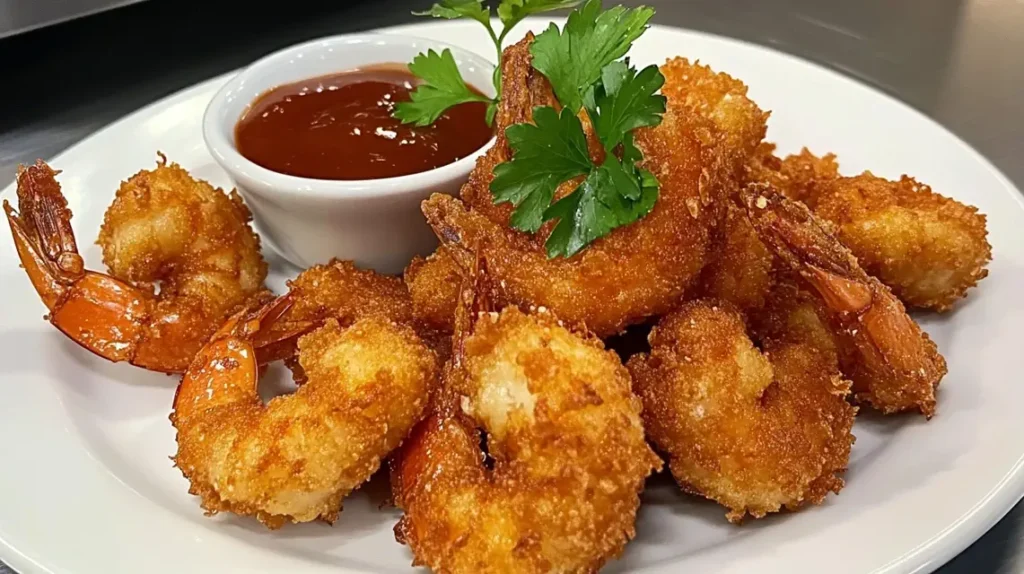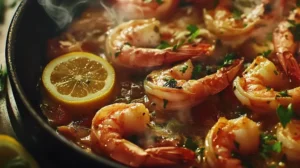Picture this: you’re craving a delicious shrimp dish, but your shrimp is frozen solid. Now what? Do you need to thaw it first, or can you cook shrimp straight from the freezer? The answer might surprise you!
In this ultimate guide, we’ll dive deep into whether it’s safe to cook shrimp from frozen, the best cooking methods, common mistakes, and pro tips to get restaurant-quality shrimp every time. So, let’s get started!
Table of Contents
Why This Question Matters to Home Cooks
Frozen shrimp is a kitchen lifesaver. It’s affordable, easy to store, and available year-round. But the real question is: Can you cook shrimp from frozen? The short answer? Yes, you absolutely can! But there are a few things you need to know to get the best results.
“Frozen shrimp can be just as tasty as fresh shrimp—if you cook it the right way!”
Is It Safe to Cook Shrimp from Frozen?
Let’s clear up some doubts. Cooking shrimp from frozen is perfectly safe, as long as you follow the right steps. In fact, the FDA gives a green light to cooking shrimp without thawing. The key? Cooking it to the right internal temperature.
FDA Guidelines on Cooking Frozen Shrimp
The U.S. Food and Drug Administration (FDA) recommends cooking shrimp to an internal temperature of 145°F (63°C). At this temperature, shrimp is safe to eat, as bacteria or parasites are killed.
Common Safety Concerns & Myths Debunked
There are a lot of misconceptions about cooking shrimp from frozen. Let’s debunk some myths:
- Myth #1: Cooking frozen shrimp makes it rubbery – Nope! Overcooking does.
- Myth #2: You must always thaw shrimp before cooking – Not true. It depends on the method.
- Myth #3: Frozen shrimp loses flavor – Proper seasoning and cooking methods keep it delicious.
How Cooking from Frozen Affects Texture and Flavor
Cooking frozen shrimp directly does affect texture slightly—it might take a few extra minutes to cook, and it can release more water. But the good news? If done correctly, it can be just as juicy and flavorful as fresh shrimp.
For more oven-friendly recipes, try How to Cook Sam’s Club Salmon Bites for a quick and tasty seafood option.
Different Methods to Cook Shrimp from Frozen
Alright, let’s talk cooking! Shrimp is super versatile, and you can cook it from frozen in multiple ways. Here are the best methods:
Method 1: Boiling Frozen Shrimp (Quick and Easy)
Boiling shrimp is the easiest way to cook it from frozen. Here’s how:
Ingredients:
| Ingredient | Quantity |
|---|---|
| Frozen shrimp | 1 lb (450g) |
| Water | 4 cups |
| Salt | 1 tbsp |
| Lemon (optional) | 1 slice |
Instructions:
- Bring water to a rolling boil in a large pot.
- Add salt and lemon for extra flavor.
- Drop in frozen shrimp and cook for about 4-6 minutes.
- Drain and serve with your favorite dipping sauce!
“Boiling is perfect when you need shrimp fast for pasta, salads, or tacos.”
Method 2: Sautéing Frozen Shrimp (Best for Flavor)
Sautéing gives you a rich, caramelized flavor. It’s one of the best ways to cook shrimp from frozen.
Ingredients:
| Ingredient | Quantity |
|---|---|
| Frozen shrimp | 1 lb (450g) |
| Olive oil | 2 tbsp |
| Garlic (minced) | 2 cloves |
| Salt & pepper | To taste |
| Paprika (optional) | ½ tsp |
Instructions:
- Heat olive oil in a pan over medium heat.
- Add frozen shrimp (don’t overcrowd the pan).
- Cook for about 7-8 minutes, stirring occasionally.
- Add garlic, salt, pepper, and paprika in the last 2 minutes.
- Once shrimp turns pink and opaque, remove from heat and serve!
“Sautéing frozen shrimp brings out deep flavors, making it perfect for rice bowls, pasta, or tacos.”
Method 3: Baking Frozen Shrimp (Great for Seasoned Dishes)
If you love hands-off cooking, baking is the way to go. It lets the oven do all the work while infusing shrimp with delicious flavors.
Ingredients:
| Ingredient | Quantity |
|---|---|
| Frozen shrimp | 1 lb (450g) |
| Butter (melted) | 2 tbsp |
| Garlic powder | 1 tsp |
| Paprika | ½ tsp |
| Salt | To taste |
Instructions:
- Preheat oven to 400°F (200°C).
- Line a baking tray with parchment paper.
- Arrange frozen shrimp in a single layer.
- Drizzle melted butter and sprinkle seasonings.
- Bake for 10-12 minutes, flipping halfway through.
- Enjoy crispy, flavorful shrimp!
“Baking shrimp is ideal for meal preps, shrimp tacos, or a quick dinner!”
Pair your boiled shrimp with a flavorful dish like Cajun Shrimp Pasta for a delicious meal.
Method 4: Air Frying Frozen Shrimp (Crispy Perfection)
Want crispy shrimp without deep frying? The air fryer is your best friend! It gives shrimp that perfect crunch while keeping it juicy inside.
Ingredients:
| Ingredient | Quantity |
|---|---|
| Frozen shrimp | 1 lb (450g) |
| Olive oil | 1 tbsp |
| Breadcrumbs (optional) | ½ cup |
| Garlic powder | 1 tsp |
| Paprika | ½ tsp |
| Salt & pepper | To taste |
Instructions:
- Preheat air fryer to 400°F (200°C).
- Coat frozen shrimp lightly with olive oil and seasonings.
- Arrange shrimp in a single layer in the air fryer basket.
- Air fry for 8-10 minutes, shaking the basket halfway through.
- Serve hot with your favorite dipping sauce!
“Air frying frozen shrimp gives you the perfect crunch without the excess oil. Perfect for a quick and healthy meal!”
Method 5: Grilling Frozen Shrimp (BBQ Lovers’ Favorite)
Yes, you can grill frozen shrimp! It just takes a little extra care to get that smoky, charred flavor.
Ingredients:
| Ingredient | Quantity |
|---|---|
| Frozen shrimp | 1 lb (450g) |
| Olive oil | 2 tbsp |
| Garlic powder | 1 tsp |
| Lemon juice | 1 tbsp |
| Salt & pepper | To taste |
Instructions:
- Preheat the grill to medium-high heat.
- Toss frozen shrimp with olive oil and seasonings.
- Thread shrimp onto skewers for even cooking.
- Grill for about 5-7 minutes, flipping halfway through.
- Once shrimp turns pink and slightly charred, remove and serve!
“Grilling shrimp from frozen gives it a smoky depth of flavor—perfect for BBQ nights!”

Common Problems and How to Fix Them
Cooking shrimp from frozen isn’t hard, but sometimes things go wrong. Let’s troubleshoot!
Problem: Shrimp Turns Rubbery – How to Fix It?
What went wrong? Overcooking! Shrimp cooks fast, and leaving it too long on heat makes it rubbery.
Solution:
- Cook only until the shrimp turns pink and opaque (usually 5-7 minutes).
- Use medium heat instead of high heat.
- If boiling, remove shrimp as soon as they float.
“The key to tender shrimp? Don’t overcook it! Once it turns pink, it’s done.”
Problem: Shrimp Tastes Watery – What Went Wrong?
What happened? Frozen shrimp releases extra water when cooked, diluting the flavor.
Fix it:
- Pat shrimp dry with a paper towel before cooking.
- Sauté or grill instead of boiling to retain more flavor.
- Add seasoning after cooking to enhance taste.
Problem: Uneven Cooking – How to Avoid It?
What’s the issue? Some shrimp cook faster than others.
Solution:
- Cook shrimp in a single layer (avoid overcrowding the pan).
- If using an oven or air fryer, flip shrimp halfway through.
- For grilling, use skewers for even heat distribution.
Best Practices for Cooking Shrimp from Frozen
How to Properly Season Frozen Shrimp
Want flavorful shrimp? Seasoning is key! But frozen shrimp doesn’t absorb flavors as well as fresh shrimp, so here’s what you can do:
- Season shrimp right after cooking instead of before.
- Use strong flavors like garlic, lemon, and chili flakes.
- Try marinades AFTER shrimp is cooked (especially for grilled shrimp).
Do You Need to Devein Shrimp Before Cooking?
Not always. Some shrimp come pre-deveined, while others have the vein intact.
Should you devein?
- If the vein looks dark and gritty, remove it for better texture.
- If it’s clear, it’s safe to eat.
- For frozen shrimp, deveining is easier after cooking.
Should You Rinse Frozen Shrimp Before Cooking?
Nope! Rinsing shrimp can introduce bacteria and make it watery. Instead, just cook it straight from frozen.
“Avoid rinsing shrimp—cooking directly keeps it safe and tasty.”
Pro Tips for the Best Shrimp Dishes
Pro Tip #1: Choosing High-Quality Frozen Shrimp
Not all frozen shrimp are created equal! Here’s what to look for:
- Wild-caught shrimp for better flavor.
- IQF (Individually Quick Frozen) shrimp—keeps it fresh.
- Avoid shrimp with preservatives or excess ice crystals.
Pro Tip #2: Secret Ingredient Hacks for Maximum Flavor
Want next-level shrimp? Try these secret ingredients:
- Butter & garlic: Classic combo for rich flavor.
- Chili flakes & lime: A zesty kick for grilled shrimp.
- Honey & soy sauce: Sweet and savory magic for sautéed shrimp.
Pro Tip #3: Top Sauces and Marinades to Try
Here are some delicious sauces to pair with shrimp:
- Garlic Butter Sauce: Melted butter + minced garlic + lemon juice.
- Spicy Sriracha Mayo: Mayo + Sriracha + lime juice.
- Honey Garlic Glaze: Soy sauce + honey + garlic.

Frequently Asked Questions (FAQs)
Still got questions? Here are the most common ones answered!
Can You Cook Frozen Shrimp in the Microwave?
Technically, yes. But should you? Probably not. Microwaving shrimp can make it rubbery and unevenly cooked.
Best alternative: If you’re in a rush, boil or sauté instead—it’s quicker and gives better texture.
Is It Better to Thaw Shrimp Before Cooking?
It depends on the cooking method:
- For boiling, sautéing, and baking → No need to thaw.
- For grilling or air frying → Thawing helps with even cooking.
How Long Should You Cook Frozen Shrimp?
Shrimp cooks FAST! Here’s a quick guide:
| Cooking Method | Cooking Time |
|---|---|
| Boiling | 4-6 minutes |
| Sautéing | 7-8 minutes |
| Baking | 10-12 minutes |
| Air Frying | 8-10 minutes |
| Grilling | 5-7 minutes |
“If you overcook shrimp, it turns rubbery! Stick to these cooking times for the best results.”
Health Benefits of Eating Shrimp
Shrimp isn’t just tasty—it’s also packed with nutrients! Here’s why you should add shrimp to your diet:
1. High in Protein, Low in Calories
One serving of shrimp (100g) provides about 24g of protein with only 99 calories. Perfect for weight loss and muscle building!
2. Rich in Omega-3 Fatty Acids
Shrimp contains heart-healthy omega-3s that help reduce inflammation and support brain function.
3. Packed with Vitamins & Minerals
Shrimp is a great source of:
- Vitamin B12: Supports nerve health.
- Selenium: A powerful antioxidant.
- Zinc & Iron: Boosts immunity and energy levels.
4. Low in Mercury
Unlike some seafood, shrimp has very low mercury levels, making it a safe choice for regular consumption.
Love using your air fryer? Check out Frozen Crab Cakes in Air Fryer for another quick seafood recipe.
Nutrition Facts: Shrimp (100g Serving)
| Nutrient | Amount |
|---|---|
| Calories | 99 kcal |
| Protein | 24g |
| Fat | 0.3g |
| Carbohydrates | 0g |
| Omega-3 Fatty Acids | 295 mg |
| Vitamin B12 | 80% of RDI |
| Selenium | 48% of RDI |
| Iron | 15% of RDI |
Final Thoughts: Yes, You Can Cook Shrimp from Frozen!
So, can you cook shrimp from frozen? Absolutely! It’s safe, easy, and can be just as delicious as fresh shrimp—if you do it right.
Here’s a quick recap:
- You don’t need to thaw shrimp before cooking.
- Choose the right cooking method: boiling, sautéing, baking, air frying, or grilling.
- Follow the right cooking times. Overcooking = rubbery shrimp!
- Season well! Shrimp is mild in flavor, so add bold spices.
- It’s super healthy! Low-calorie, high-protein, and full of nutrients.
Now, it’s your turn! Go grab that bag of frozen shrimp and start cooking. Whether you sauté it in garlic butter, toss it in a salad, or grill it for a BBQ, shrimp is one of the easiest (and tastiest) proteins to cook.
“Great food doesn’t have to be complicated. Keep it simple, use fresh ingredients, and enjoy every bite!”
What’s Your Favorite Way to Cook Shrimp?
Do you prefer crispy air-fried shrimp or juicy garlic butter shrimp? Let us know in the comments!

Quick Sautéed Frozen Shrimp
Equipment
- Skillet
- Paper Towels
Ingredients
Sautéed Frozen Shrimp
- 1 lb frozen shrimp peeled and deveined
- 1 tbsp olive oil
- 2 cloves garlic minced
- 1/2 tsp paprika optional
- Salt and pepper to taste
- 1 tbsp lemon juice freshly squeezed
Instructions
- Heat a large skillet over medium-high heat and add olive oil. Once hot, add frozen shrimp in a single layer.
- Cook for 5–6 minutes, stirring occasionally, until the shrimp turn pink and are no longer translucent.
- Add garlic, paprika (if using), salt, and pepper. Stir and cook for another 1–2 minutes.
- Finish with a squeeze of fresh lemon juice. Remove from heat and serve immediately with rice, pasta, or salad.

